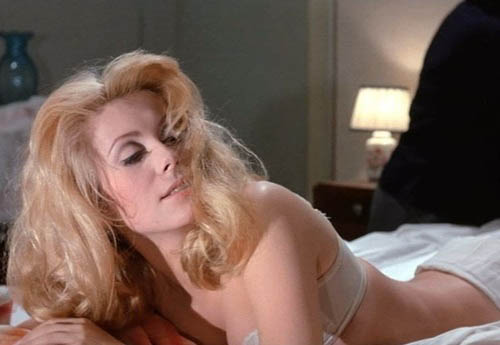Belle de Jour (1967) directed by Luis Bunuel
Belle de Jour begins with a startling rape fantasy scene where its main character Severine imagines her husband ordering two men to humiliate and dominate her. In reality her husband is near perfect, handsome, considerate and caring, but does not fulfill her innermost sexual desires. This is a film about sexual repression, fantasies and the means to liberate them.
When finding out that someone she knows has taken to prostitution in a brothel, Severine displays disgust but deep down inside she is erotically intrigued. She works up the courage to go to one and without any explanation or fanfare she decides to become a prostitute. While most girls do it for the money, she does it to fulfill her fantasies and liberate her sexual being. In the process we see that the nature of sexual desire isn't merely the act of sex (there are no explicit sex scenes in the film) but rather in the mind. We see several clients with odd fetishes that are difficult to explain. One involves a mysterious buzzing box and the sound of bells, while another involves some strange funeral ritual. The most normal fetish is simple domination which Severine observes with disgust yet watches intently. Severine's own domination fantasy involves mud being thrown at her tied-up body. If you watch enough porn, you'll eventually come across some crazy stuff that is just impossible to explain. Some of it is so bizarre and/or disgusting you can't believe anyone would watch it yet some people clearly do. What makes it sexually provocative isn't the sex itself but the idea of it. Despite its steamy premise, Belle de Jour is more psychological than sexy, but hardly any less erotic or provocative than typical Hollywood T&A flicks. It is only so long before Severine's two worlds intertwine with each other, just as it her fantasies become more interlaced with her reality. By the end it is difficult to differentiate what is real and what isn't.
This is a hard movie to explain, yet so fascinating to watch. It may not be for everyone as it is the slow kind of artsy film that is purposely ambiguous and symbolic that some people just hate, but I was totally engrossed by it. It's hard to explain why I liked this movie so much, other than that I'm probably some type of sexual deviant with crazy unknown fetishes of my own. Kidding! (Sort of.)
Grade: A-
Belle de Jour begins with a startling rape fantasy scene where its main character Severine imagines her husband ordering two men to humiliate and dominate her. In reality her husband is near perfect, handsome, considerate and caring, but does not fulfill her innermost sexual desires. This is a film about sexual repression, fantasies and the means to liberate them.
When finding out that someone she knows has taken to prostitution in a brothel, Severine displays disgust but deep down inside she is erotically intrigued. She works up the courage to go to one and without any explanation or fanfare she decides to become a prostitute. While most girls do it for the money, she does it to fulfill her fantasies and liberate her sexual being. In the process we see that the nature of sexual desire isn't merely the act of sex (there are no explicit sex scenes in the film) but rather in the mind. We see several clients with odd fetishes that are difficult to explain. One involves a mysterious buzzing box and the sound of bells, while another involves some strange funeral ritual. The most normal fetish is simple domination which Severine observes with disgust yet watches intently. Severine's own domination fantasy involves mud being thrown at her tied-up body. If you watch enough porn, you'll eventually come across some crazy stuff that is just impossible to explain. Some of it is so bizarre and/or disgusting you can't believe anyone would watch it yet some people clearly do. What makes it sexually provocative isn't the sex itself but the idea of it. Despite its steamy premise, Belle de Jour is more psychological than sexy, but hardly any less erotic or provocative than typical Hollywood T&A flicks. It is only so long before Severine's two worlds intertwine with each other, just as it her fantasies become more interlaced with her reality. By the end it is difficult to differentiate what is real and what isn't.
This is a hard movie to explain, yet so fascinating to watch. It may not be for everyone as it is the slow kind of artsy film that is purposely ambiguous and symbolic that some people just hate, but I was totally engrossed by it. It's hard to explain why I liked this movie so much, other than that I'm probably some type of sexual deviant with crazy unknown fetishes of my own. Kidding! (Sort of.)
Grade: A-






